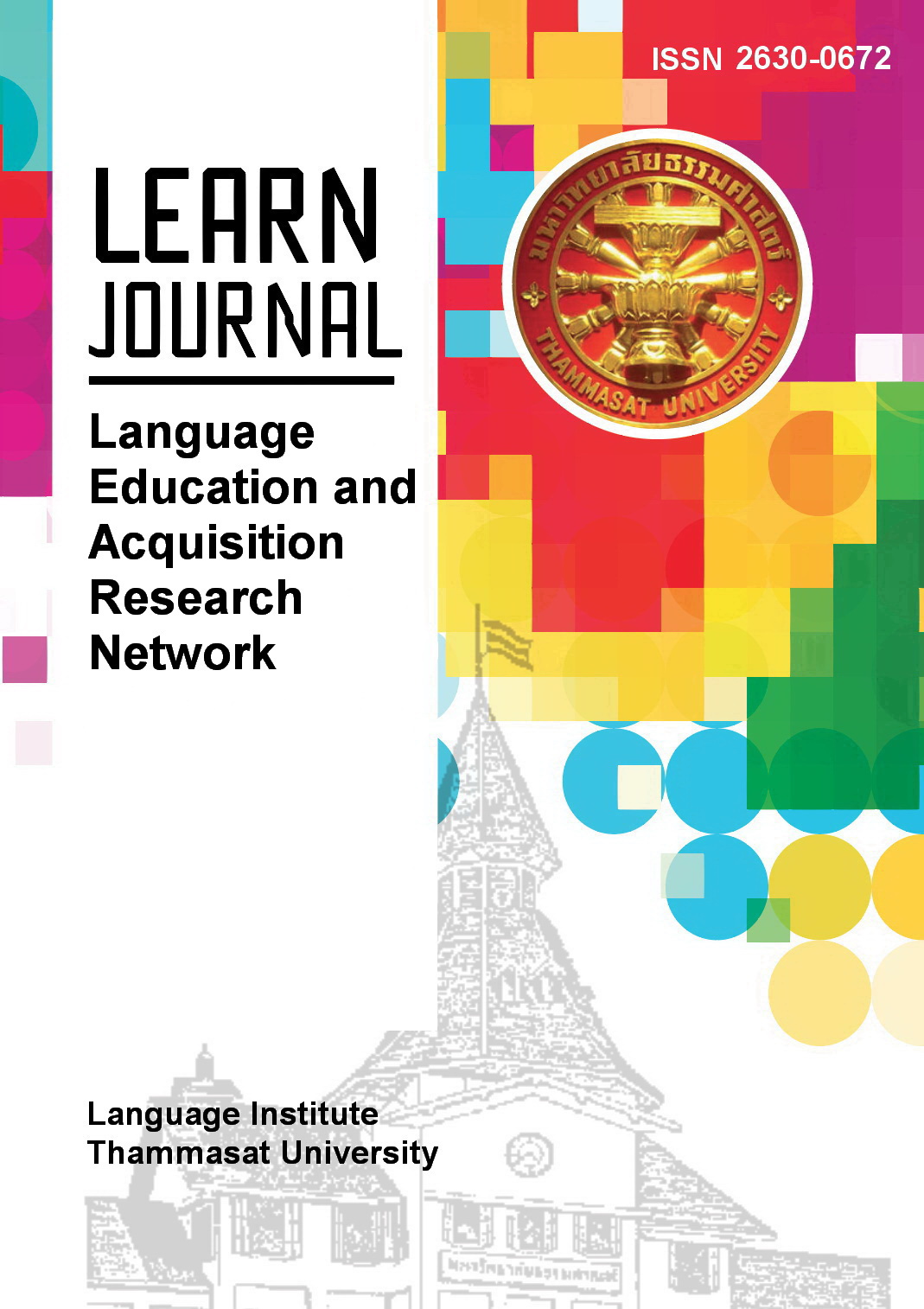The Enhancements of Self-Directed Learning on Tertiary Level Students’ English Reading Skills: A Thai Private University Context
Main Article Content
Abstract
This study aimed to investigate the enhancements of Self-Directed Learning (SDL) on tertiary-level students’ English reading skills in a private university context and their perceptions towards it. Thirty-eight first-year English-major subjects participated in a 6-week experiment. A mixed method of quantitative and qualitative approaches was used for data collection with four instruments: 1) English reading texts; 2) pre- and post-tests to measure the enhancements of students' reading skills using SDL; 3) students' journals; and 4) a questionnaire. The quantitative data was analyzed by SPSS, while the qualitative data was analyzed using thematic content. The results showed that the mean of the post-test was higher than the pre-test, indicating that SDL significantly enhanced students' English reading skills. Students' journals revealed that these students lacked the skills needed to read effectively in English. The questionnaire discovered that most students had favorable opinions of SDL, though a few were negative about it. This confirms the relationship between SDL and improving the English language and approves the role of reading in SDL, thus providing a reference for future learners to learn other foreign languages. In addition, schools and teachers can also realize the help that SDL can bring to students and make corresponding improvements.
Article Details
References
Akopyan, A., & Saks, K. (2022). Effects of the Reading Practice Platform (Readvise) in Developing Self-Regulated Reading Skills of Tertiary Students in L2 Learning. Education Sciences, 12(4), 238.
Bonk, C. J., & Lee, M. M. (2017). Motivations, achievements, and challenges of self-directed informal learners in open educational environments and MOOCs. Journal of Learning for Development, 4(1), 36-57.
Brockett, R. G., & Hiemstra, R. (2018). Self-direction in adult learning: Perspectives on theory, research, and practice. Routledge.
Brookfield, S. D. (2013). Powerful techniques for teaching adults. Jossey-Bass.
Brown, H. D. (2007). Teaching by principles. An interactive approach to language pedagogy (3rd ed.). Pearson-Longman.
Each, N., & Suppasetseree, S. (2021). The effects of mobile-blended cooperative learning on EFL students’ listening comprehension in Cambodian context. LEARN Journal: Language Education and Acquisition Research Network, 14(2), 143–170.
EF Education First. (2017-2022). The world’s largest ranking of countries and regions by English skills. https://www.ef.com/assetscdn/WIBIwq6RdJvcD9bc8RMd/cefcom-epi-site/reports/2022/ef-epi-2022-english.pdf.
Harmer, J. (2007). The practice of English language teaching (4th ed.). Pearson-Longman.
Herlo, D. (2017). Self-directed learning on teacher training studies programs. Educația Plus, 18(2), 7-17.
Jenwitthayayot, W., & Tepsuriwong, S. (2016). Students’ perceptions about their self-study experience. rEFLections, 21, 55–75.
Karatas, K., & Arpaci, I. (2021). The role of self-directed learning, metacognition, and 21st century skills predicting the readiness for online learning. Contemporary Educational Technology, 13(3), 1-13.
Kaur, A., Young, D., & Kirkpatrick, R. (2016). English education policy in Thailand: Why the poor results? In R., Kirkpatrick (Eds.), English Language Education Policy in Asia. (pp. 345-361). Springer International Publishing.
Khazaal, E. N. (2019). Impact of intensive reading strategy on English for specific purposes college students’ in developing vocabulary. Arab World English Journal (AWEJ), 10(2), 181–195.
Knowles, M.S. (1975). Self-directed learning: A guide for learners and teachers. Association Press.
Lee, L. (2007). Fostering second language oral communication through constructivist interaction in desktop videoconferencing. Foreign language annals, 40(4), 635-649.
Likert, R. (1932). A technique for the measurement of attitudes. Archives of Psychology, 140, 1-55.
North, B., & Piccardo, E. (2018). Aligning the Canadian Language Benchmarks (CLB) to the Common European Framework of References (CERF). Centre for Canadian Language Benchmarks.
Nunan, D. (2003). Practical English language teaching. McGraw Hill.
Office of the Education Council. (2017). The National Education Plan A.C. 2017-2036 (B.E. 2560-2579). OEC Bangkok, Thailand.
Phungsuk, R., Viriyavejakul, C., & Ratanaolarn, T. (2017). Development of a problem-based learning model via a virtual learning environment. Kasetsart Journal of Social Sciences, 38(3), 297-306.
Platt, C. A., Amber, N. W., & Yu, N. (2014). Virtually the same?: Student perceptions of the equivalence of online classes to face-to-face classes. Journal of Online Learning and Teaching, 10(3), 489.
Pongsatornpipat, W. (2021). Interactive group in extensive reading to enhance reading ability of Thai undergraduate students. LEARN Journal: Language Education and Acquisition Research Network, 14(2), 342–371.
Prasongporn, P. (2016). English education at primary level in Thailand. National Institute for Educational Policy Research (NIER), 111-115.
Rao, P. S. (2019). The role of English as a global language. Research Journal of English, 4(1), 65-79.
Ray, R. (2007). Designing and conducting mixed methods research. Qualitative Research Journal, 7(2), 90-92.
Sappapan, P. (2022). Promoting EFL first-year students’ autonomy through consultation services. LEARN Journal: Language Education and Acquisition Research Network, 15(1), 654–681.
Swatevacharkul, R. (2017). The effects of self-directed learning on the English reading comprehension ability of MBA students. The New English Teacher, 11(1), 96–119.
Taladngoen, U., Palawatwichai, N., Estaban, R. H., & Phuphawan, N. (2020). A study of factors affecting EFL tertiary students’ reading comprehension ability. Rangsit Journal of Educational Studies, 7(1), 12–21.
Tantiwich, K., & Sinwongsuwat, K. (2021). Thai university students' problems of language use in English conversation. LEARN Journal: Language Education and Acquisition Research Network, 14(2), 598-626.
Waluyo, B. (2019). Examining Thai first-year university students’ English proficiency on CEFR levels. The New English Teacher, 13(2), 51–71.
Wichadee, S. (2011). Developing the self-directed learning instructional model to enhance English reading ability and self-directed learning of undergraduate students. Journal of College Teaching & Learning (TLC), 8(12), 43-52.
Zhu, M. (2021). Enhancing MOOC learners’ skills for self-directed learning. Distance Education, 42(3), 441-460.
Zhu, M., Bonk, C. J., & Berri, S. (2022). Fostering Self-Directed Learning in MOOCs: Motivation, Learning Strategies, and Instruction. Online Learning, 26(1), 153-173.


